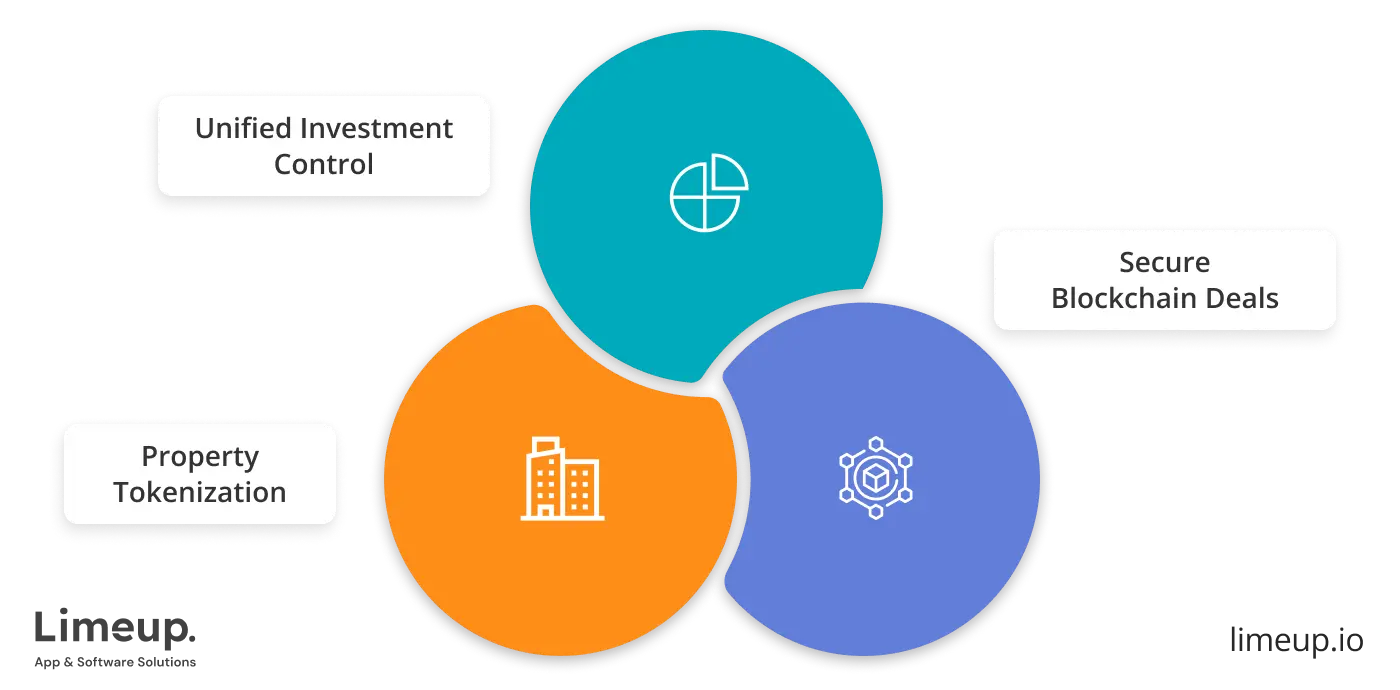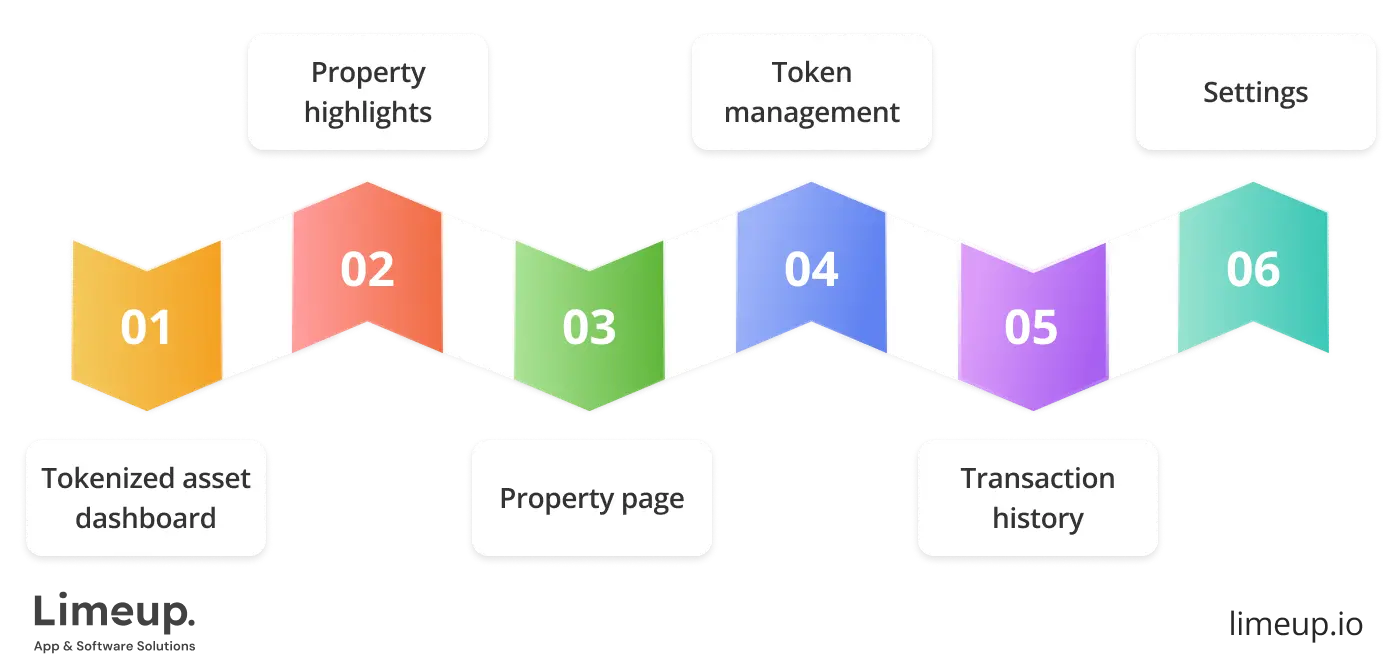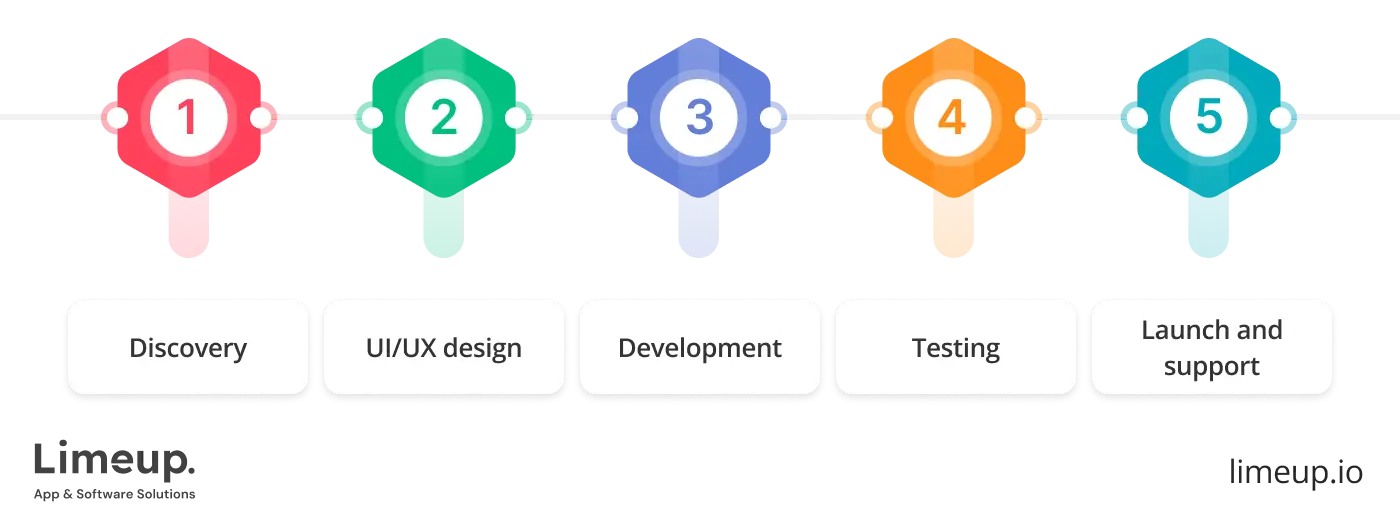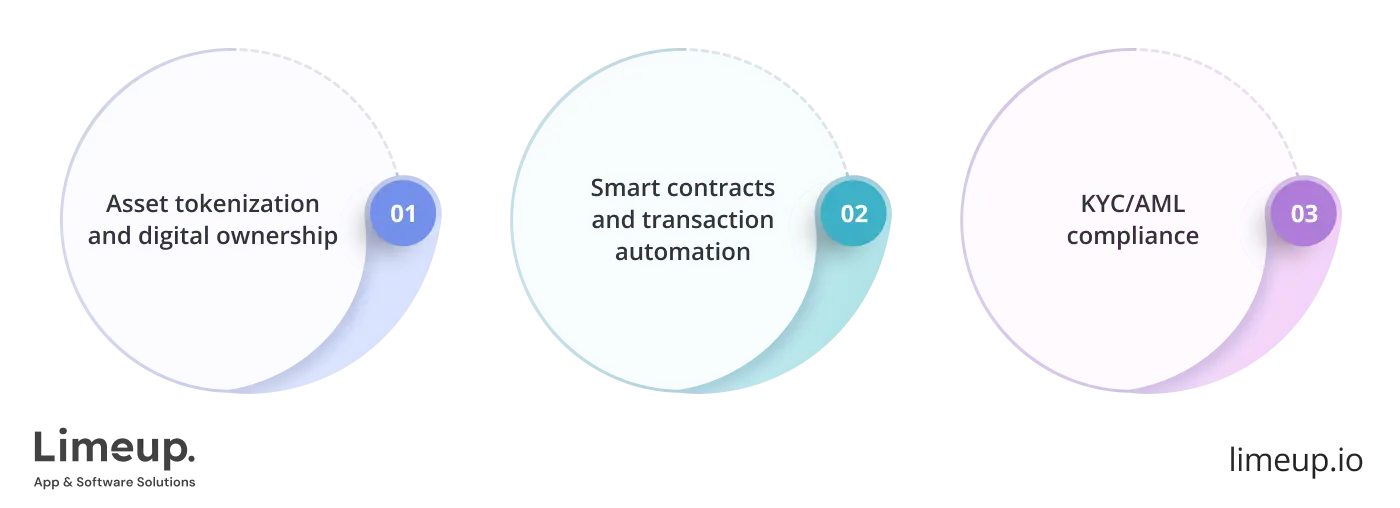Real Estate Tokenization Platform Development: Guide (2026)

The rise of real estate tokenization platform development can be explained by the growing demand for innovative fintech solutions across many domains, including super-conservative industries like real estate.
But how to create such a platform that will meet market demands, legal requirements, and user needs, all at the same time? This is what we will talk about in this article, covering the 5-step process of creating a reliable system for real estate requirements.
The purpose of this piece is to explore the essence of a real estate tokenization platform and its features, hereafter providing you with a workable plan on how to create such a solution. Stay with us to grasp the basics of the development process and discover the challenges to be aware of when creating products of this kind.
What is a real estate tokenization platform?
As its name indicates, this is a piece of software (usually a web or mobile application) used for real estate tokenization. Such platforms allow for the tokenization of either commercial or residential real estate, or both.
The target audience of real estate tokenization solutions includes real estate asset owners, real estate representatives, consultants, and investors. With the help of such platforms, users can manage their tokenized ownership, make and manage investments, keep track of their operations, and more.

As you see, real estate tokenization platforms are end-to-end solutions for blockchain-based real estate operations. Users can tokenize and fraction their ownership, trade or purchase tokens, sign smart contracts, securely go through the real estate transaction process, etc. in one reliable and secure system.
Considering statistics for this niche, Deloitte predicts that by 2035, $4 trillion of real estate will be tokenized. It is one of the most promising markets, and in the text below, you will understand how it works through a real-world sample.
Example of a real estate tokenization platform
Today, there are not so many markets with low competition, but real estate tokenization is one of these. The great benefit of this field is that it’s not overloaded so far, meaning you have a big chance to conquer it with your solution.
A story that may inspire you to enter this market is the launch of Blockch.in, a real estate tokenization platform we’ve developed for our German client.
The client came to us with a clear determination to boost the liquidity of the real estate market by enabling users to tokenize and trade their real estate assets. The task of Limeup was to design and develop mobile and web applications for Blockch.in.
After conducting a deep market analysis and research-driven interviews, our design team uncovered who the target client of the platform is. Based on the data collected, we’ve designed a consistent user journey and created a prototype of the solution.
After we added feedback-based enhancements to the prototype, our team started a full-scale real estate tokenization platform development. The client has got web and mobile applications for Blockch.in where users can manage their real estate tokens, purchase new ones, analyze their income, keep track of ownership fractions, and much more.
Here are the core features of our tokenized real estate solution that allow for easy and hassle-free token management:

— Tokenized asset dashboard. Here, a user can check all their tokens in one place and get investment suggestions on the tokens they can purchase.
— Property highlights. This feature allows a user to view a real estate asset available for investment, with further calculation of possible profit, interest rates, as well as the funds required.
— Property page. After clicking on the specific property, a user gets to the page where they can check on the details of real estate assets, including the property’s location, value, and size.
— Token management. Users manage their investments by checking the data on each token, including its value, payment details, related documents, and more.
— Transaction history. Here, users can check the details of each transaction and the history of transactions, which also streamlines finance management.
— Settings. This feature is common to most real estate tokenization platforms and allows users to manage their account details, add two-factor authentication, get the assistance of a conversational chatbot, etc.
Interestingly, the user research showed that our user persona possesses good analytical skills and spends most of their time at a PC. Yet, they struggle with complicated investment processes, which stop them from purchasing real estate tokens.
Our platform solves this challenge by providing the audience with an intuitive and user-centric interface. The logic of information structures on the platform is likely to resemble other solutions the target audience uses. Thus, it poses no difficulties for them to sign up and start generating profit from the right investments.
5 Steps for real estate tokenization platform development
Developing a real estate tokenization solution requires you to dive deeply into the market requirements and the challenges that the target audience faces. It is highly beneficial when built by a reliable tech partner, as “these solutions are secure and compliant and increase market liquidity, accessibility…” citing the research.
Below, Limeup experts share their 5-step process for creating real estate platforms using blockchain technology. Each of the steps is complex and involves the collaboration of many teams, which results in consistent product strategy and a 360-degree view of the user’s needs.

Discovery
The first step of the real estate tokenization services is collecting data and analyzing requirements.
The purpose of this step is to get a deep understanding of the client’s request as well as user needs. The perfect scenario each business should strive to reach is to fully align the project goals they set with the needs of their target audience.
The discovery step when creating real estate tokenization platforms is facilitated by market and competitor research, which helps the design and development team identify and analyze top performers and their strengths and implement the insights into the project.
What’s even more effective, the team also looks for market gaps that can be filled with a new product, thereby increasing the chances that it will be in demand among the audience.
The golden rule of the discovery step is to avoid guesswork. Even if a product idea seems flawless, it’s always recommended to gather data on its potential before diving into the next steps. This will help you figure out what features, intents, and messages you should add to your product.
As a result of joint effort, the client gets a consistent project roadmap with all the timelines, tools, resources, and specifications outlined.
UI/UX design
Stage 2 of real estate tokenization platform development is dedicated to creating a functional UI/UX design that reflects the company’s brand spirit and catches the user’s eye at the same time.
To build the right features for real estate asset management, we start by creating wireframes that serve as skeletons of the end product and demonstrate what the layout will look like. After testing, enhancing, and validating the wireframe, our design team creates a clickable prototype.
The prototypes are used by our team to look at the product from the user perspective, test the buttons, features, and functionality, and generally ensure that the product is delivered in accordance with the project objectives.
At the stage of UI/UX design, we combine our deep expertise with the understanding of market requirements to create compelling and engaging interfaces and allow users to tokenize real estate assets in a matter of minutes.
Not only should the interface look pretty, but also be intuitive and performant. For this, we leverage the insights and results of marker analysis completed at the first step and create an effective information architecture that covers all user needs.
Development
Real estate tokenization software platform development involves building features and functionality of the product from scratch, as well as integrating third-party solutions.
Our development specialists write clean code that later can be scaled and easily maintained. Real estate tokenization solutions are a part of the growing fintech industry where data and money security are a top priority for service providers.
With that in mind, Limeup experts always ensure that the user data is 100% secure and protected against cyberattacks and third-party breaches. Apart from the standard security measures, we also implement facilitated security practices like multifactor authentication as well as biometrics.
We integrate our systems only with trusted and secure providers of blockchain technology. Besides, we add various third-party services to the product, including payment gateways, tokenization services, and others.
The choice of the services is determined by the popularity of the given solutions on the target market, their reliability and security, and the features these solutions offer for the smooth real estate transaction process.
Testing
Testing helps us ensure that the products we build are secure, bug-free, and ready to function under high-traffic conditions. A series of manual and automated tests are conducted each time code pieces are added, removed, or modified.
Our testing processes can be of different types, depending on the focus. For example, our approach to testing security is not the same as the one to testing performance. This helps us get goal-focused results and maximize the product’s effectiveness before it goes live.
To test a tokenized real estate solution, we set up a test environment and define the goals of testing. Then, our QA engineers conduct unit testing, outlining the process as well as use cases.
Security testing is included in the process at each stage of real estate tokenization solution creation, being a determining factor of the platform’s positioning on the market. Similarly, we also conduct load testing and performance tuning to make sure the first customers get a positive impression of using the product and will be eager to open it again.
Launch and support
The most delightful part of real estate tokenization platform development is when the solution goes live. From that moment on, users can interact with the platform, explore its features and functionality, manage their real estate tokens, and streamline their real estate investment processes just with a few clicks.
After the product launch, our cooperation with clients continues. As a reliable design and development partner, Limeup offers ongoing support and maintenance so that you can sleep soundly without the fear that your product crashes or doesn’t work as expected.
The support and maintenance stage is essential for ensuring the product’s stable and secure performance and promptly eliminating issues if any. Based on the feedback people share after using the platform, we can also scale the solution up, adding new features, integrations, and capacities to the product.
Summing it up, these were the major steps you will go through when creating a real estate tokenization solution. Each of the steps is a complex stage of the product’s creation and involves many sub-processes. These may differ depending on the purpose, project objectives, and the functionality of your application.
You can get in touch with our team anytime to discuss the most efficient path to building a real estate tokenization product in your unique case.
Key features of a real estate tokenization platform
Those transactions involving properties which are usually complex are made easy and quick for users through a very powerful tokenization platform. The following are the critical functions that distinguish the solutions which are ready for the market from the mere prototypes that are very basic.

Asset tokenization and digital ownership
One of the critical features of any platform is the capability to transform the physical characteristics into digital assets that can be traded. The whole process begins with the property’s onboarding, which includes law papers’ uploading, title checking and appraisal by professionals to create a reliable ground to build on.
After that, the platform generates tokens under preset guidelines that mark the number of splits and what each split stands for.
Smart contracts and transaction automation
Smart contracts function as the operational backbone performing the execution of the predetermined rules without the need of a human being. Once the rental income is received, it is distributed automatically in accordance with the token holdings.
In case a person sells his/her share, the transfer will be done only if all the prescribed conditions are met — no waiting time, no potential delays caused by manual processing of documents.
KYC/AML compliance
Regulatory compliance is not an option — it’s the entrance to legal investment. The platforms include veracity checking services that authenticate papers, make a check against sanction lists, and if necessary, credential status is verified.
The users should experience no discomfort during the procedure while the strict legal requirements are satisfied in the background. Therefore you have to pay attention to the Know You Customer and Anti-Money Laundering practices.
Creating a real estate tokenization platform involves the necessity of merging technical complexity with regulatory correctness. The main components from asset tokenization, smart contract automation, compliant investor onboarding to liquid secondary markets, interact to make real estate a truly accessible asset class with the help of all these features.
How much does it cost to build a real estate tokenization platform?
Budget expectations are essential when it comes to defining your capabilities, as well as getting acknowledged of what drives the final price and how you have to allocate your resources. Below, you will find a simple table that explains the cost categories and the average price for them:
| Type | MVP | Full-scale platform |
| Overall cost | $150,000–$350,000 | $500,000–$2M+ |
| Asset tokenization module | $30,000–$60,000 | $80,000–$180,000 |
| Smart contracts | $25,000–$50,000 | $70,000–$200,000 |
| Payment integrations | $15,000–$35,000 | $50,000–$120,000 |
| Post-launch support | ±$25,000 | 15–20% of initial cost |
| UI/UX design | $15,000–$30,000 | $40,000–$100,000 |
To define the final price, it is advisable to contact a provider and agree on the hourly rate/fixed price, blockchain choice, jurisdiction for operation, complexity and more.
Ready for the real estate tokenization software platform development?
To conclude, we’ve taken you through the process of creating a real estate tokenization solution. Now you know the ins and outs of this process and are aware of the basics of how real estate tokenization works.
As you see, the process consists of universal design and development steps applied nearly to all solutions that leverage blockchain technology. However, a few extra requirements are put in when it comes to creating real estate tokenization solutions.
First, when looking for a design and development partner, focus on candidates who have already created similar projects. Experience with developing real estate tokenization software is a must if you want to build a competitive product that meets market demands.
Second, building a real estate tokenization platform is associated with a number of legal challenges. The investment process should be compliant and secure, meaning your platform should be built under the supervision of securities, accounting, real estate, and tax experts.
If neglected, the compliance issue may result in your audience feeling insecure about their money and unwilling to proceed with using your product.
Limeup is an expert design and development partner that can help you solve all the abovementioned challenges. As our portfolio includes the successful case of building a real estate tokenization solution, we are aware of all the subtleties of the real estate market.
Besides, when creating real estate tokenization software, we refer to legal experts for consultation and validation of your strategy. This helps us make sure that the solution for managing tokenized real estate assets is compliant, secure, and meets all standards.
Leave us a note, and we will shortly contact you to discuss your request. Let’s craft engaging digital experiences together!
FAQ
How does real estate tokenization work?
The ownership of real estate properties is transformed into digital tokens on a blockchain, with each token representing a part of the property. Let’s start with an example: a $1 million property might be split into ten thousand tokens, each with a value of one hundred dollars.
Smart contracts play a crucial role in this process by taking care of the different automated functions such as dividend distribution, transfer restriction enforcement, and the creation of an unalterable ownership record. Through this mechanism investors have the opportunity to buy, sell, or exchange their stakes on secondary markets efficiently.
What are the benefits of real estate tokenization?
The idea is to set the market free, to make it possible for investors to sell their positions without going through the long process of waiting months until a buyer comes around. Moreover, the lowering of investment minimums opens the door to a larger group of investors.
It is also about a low entrance for end-users, as with tokenization, even a $50 stake in commercial property becomes a reality, with trading around the clock, and other advantages.
Is real estate tokenization legal?
Yes, in most jurisdictions, working under complex regulations as tokens evolve to comply with SEC regulations for the US, KYC (Know Your Customer) and AML, property laws based on locations, and we can’t forget about the need of encryption for data safety.
How long does it take to develop a real estate tokenization platform?
A rough timeline for a simple MVP that only has the most important tokenization functions would be around 4 to 6 months. On the other hand, a fully operational platform with all possible compliance modules, trading on a secondary market, support for multiple jurisdictions, and security at an enterprise level would normally take 9 to 14 months.
Such a timeframe is greatly influenced by aspects like the complexity of regulations, the need for integrations, and the decision to create custom infrastructure or use existing protocols.
What technologies are used to build a real estate tokenization platform?
The basic technology stack generally comprises Ethereum, Polygon, or any comparable network to execute smart contracts with ERC-1400 or ERC-3643 token standards specified for regulated assets.
Identity verification API for KYC we mentioned above, custodial wallet infrastructure, secure key management are essential. Generally, the front-end is React or comparable frameworks. Among the most important integrations are payment processors, compliance providers, and possibly oracle services for real-world data feeds.

